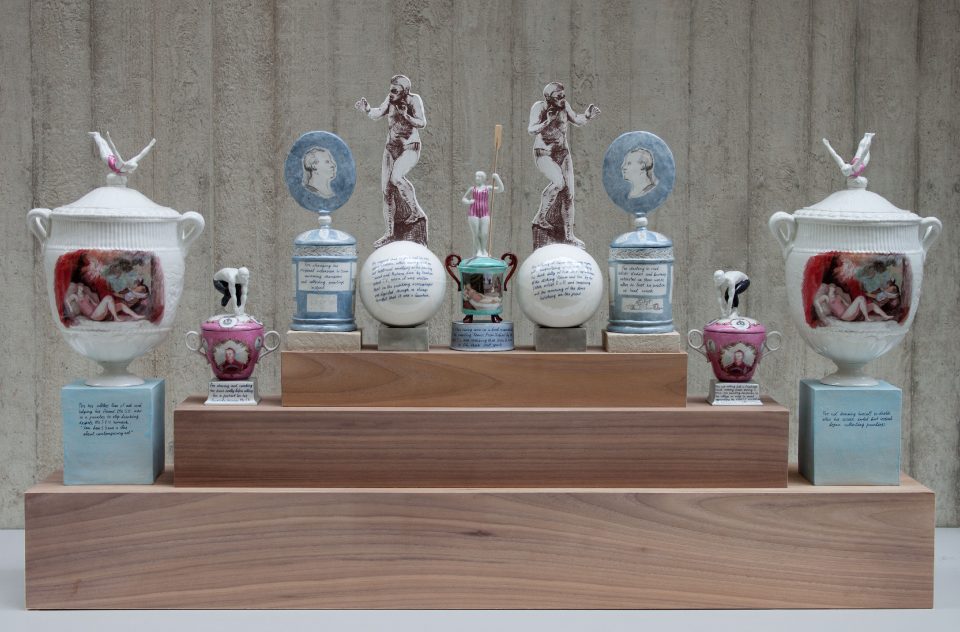 vitrine_3-1a
vitrine_3-1a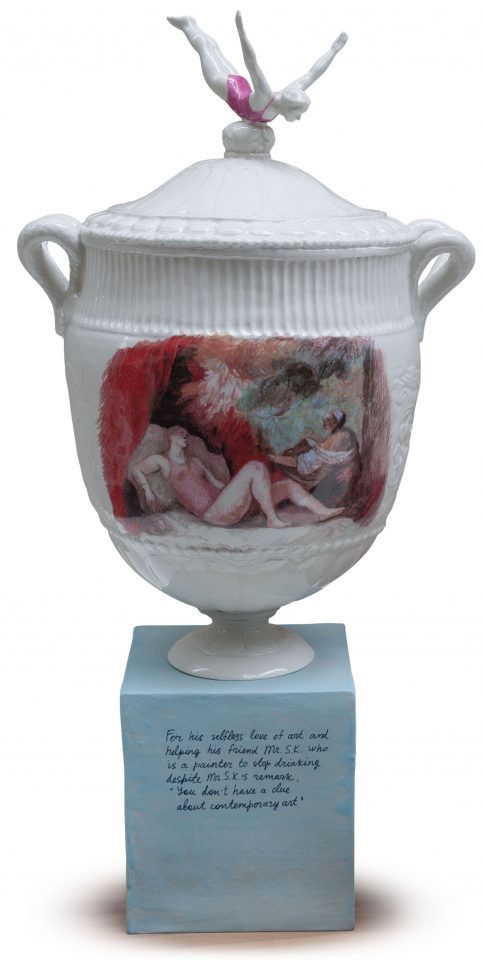 3.1-5aH ~52 cm | For his selfless love of art and helping his friend S.K. who is a painter to stop drinking despite S.K.’s remark, “You don’t have a clue about contemporary art”
3.1-5aH ~52 cm | For his selfless love of art and helping his friend S.K. who is a painter to stop drinking despite S.K.’s remark, “You don’t have a clue about contemporary art”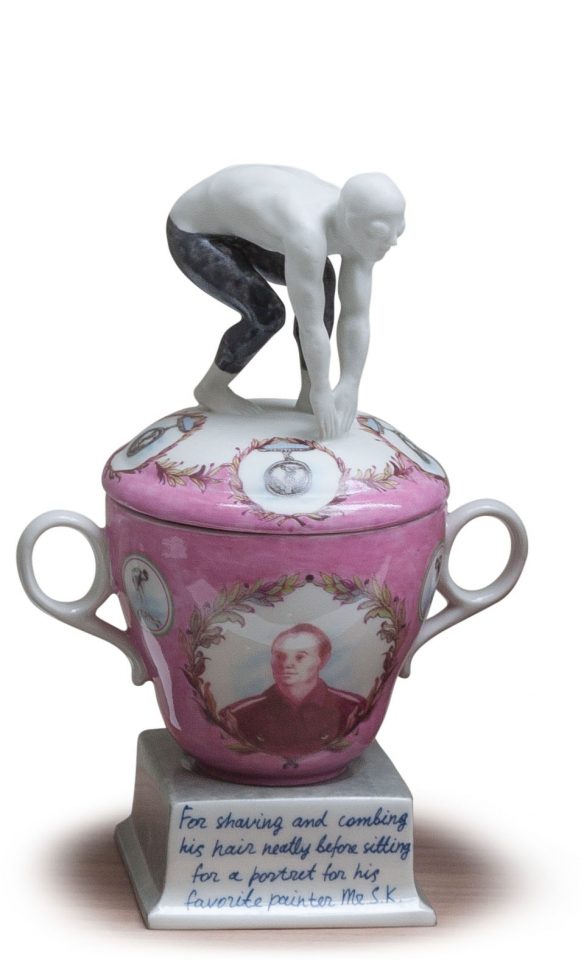 3.1-4aH ~20 cm | For shaving and combing his hair neatly before sitting for a portrait for his favouritе painter Mr. S.K
3.1-4aH ~20 cm | For shaving and combing his hair neatly before sitting for a portrait for his favouritе painter Mr. S.K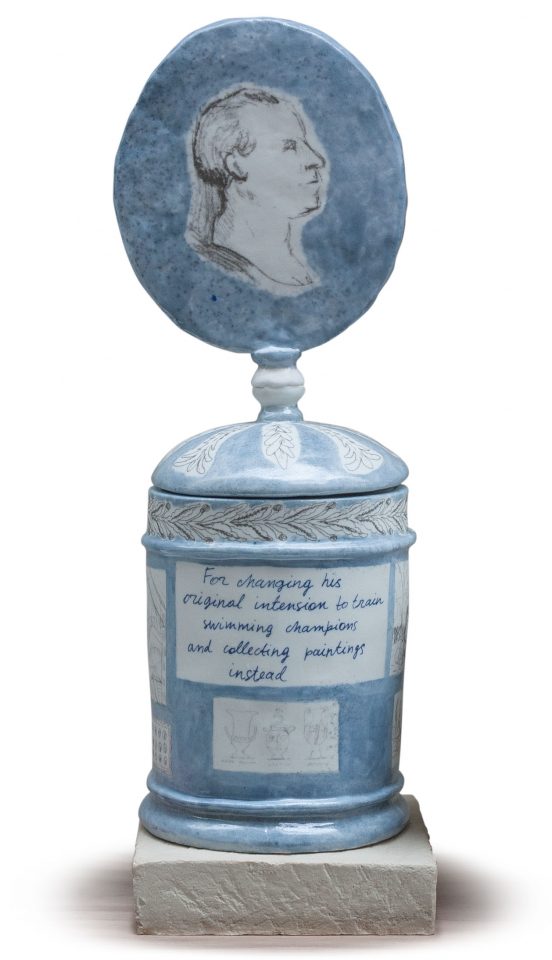 3.1-3aH ~32 cm | For changing his original intention to train swimming champions and collecting paintings instead
3.1-3aH ~32 cm | For changing his original intention to train swimming champions and collecting paintings instead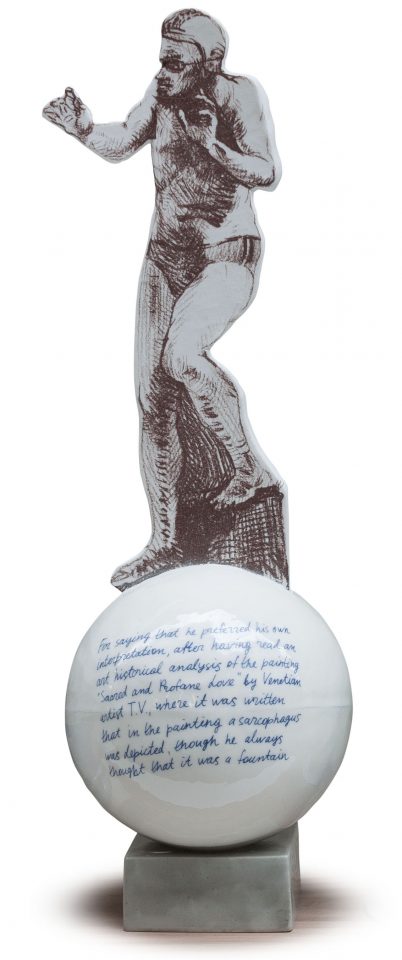 3.1-2aH ~40 cm | For saying that he preferred his own interpretation, after having read an art historical analysis of the painting “Sacred and Profane Love” by Venetian artist T.V., where it was written that in the painting a sarcophagus was depicted, though he always thought that it was a fountain
3.1-2aH ~40 cm | For saying that he preferred his own interpretation, after having read an art historical analysis of the painting “Sacred and Profane Love” by Venetian artist T.V., where it was written that in the painting a sarcophagus was depicted, though he always thought that it was a fountain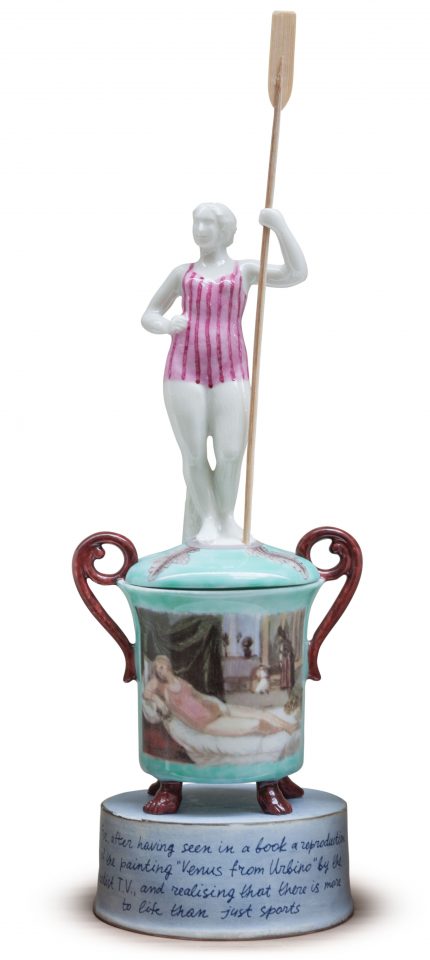 3.1-1H ~33 cm | For, after having seen in a book a reproduction of the painting “Venus from Urbino” by the artist T.V., and realising that there is more to life than just sports.
3.1-1H ~33 cm | For, after having seen in a book a reproduction of the painting “Venus from Urbino” by the artist T.V., and realising that there is more to life than just sports.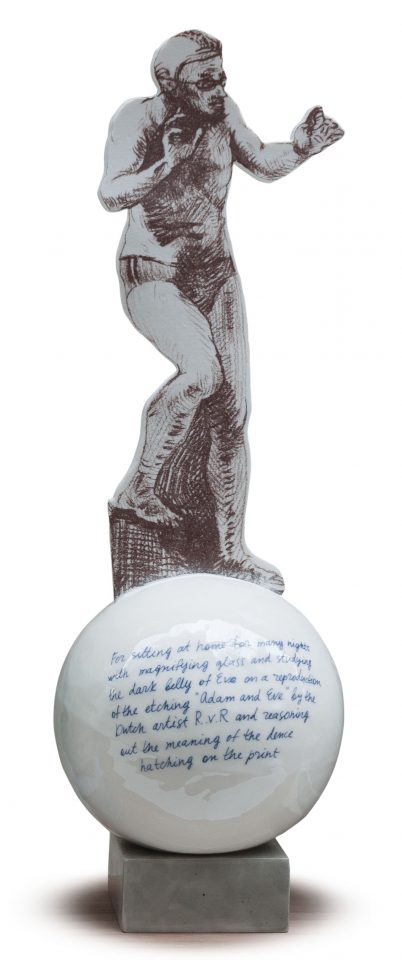 3.1-2bH ~40 cm | For sitting at home for many nights with a magnifying glass and studying the dark belly of Eve on a reproduction of the etching Adam and Eve by the Dutch artist R.v.R. and reasoning out the meaning of the dense hatching on the print
3.1-2bH ~40 cm | For sitting at home for many nights with a magnifying glass and studying the dark belly of Eve on a reproduction of the etching Adam and Eve by the Dutch artist R.v.R. and reasoning out the meaning of the dense hatching on the print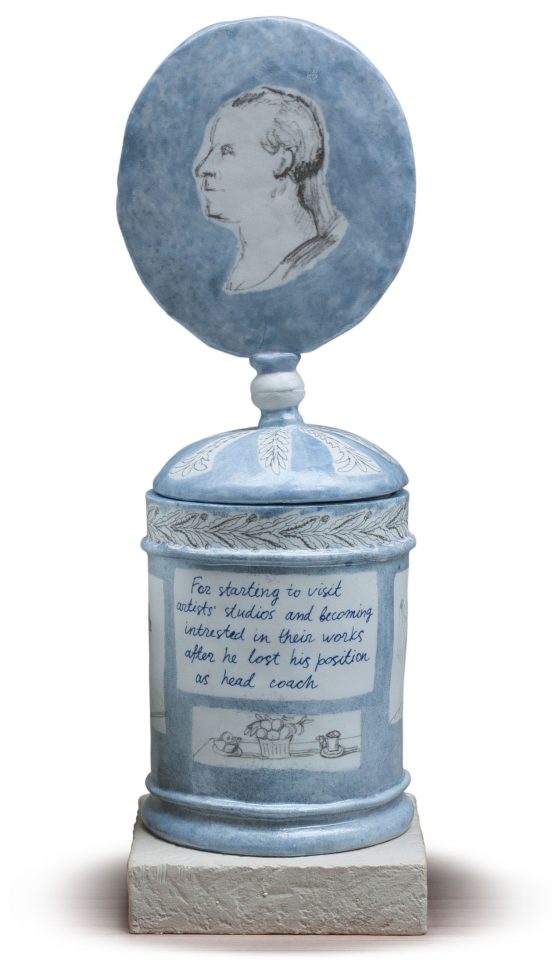 3.1-3bH ~32 cm | For starting to visit artists’ studios and becoming interested in their works after he lost his position as head coac
3.1-3bH ~32 cm | For starting to visit artists’ studios and becoming interested in their works after he lost his position as head coac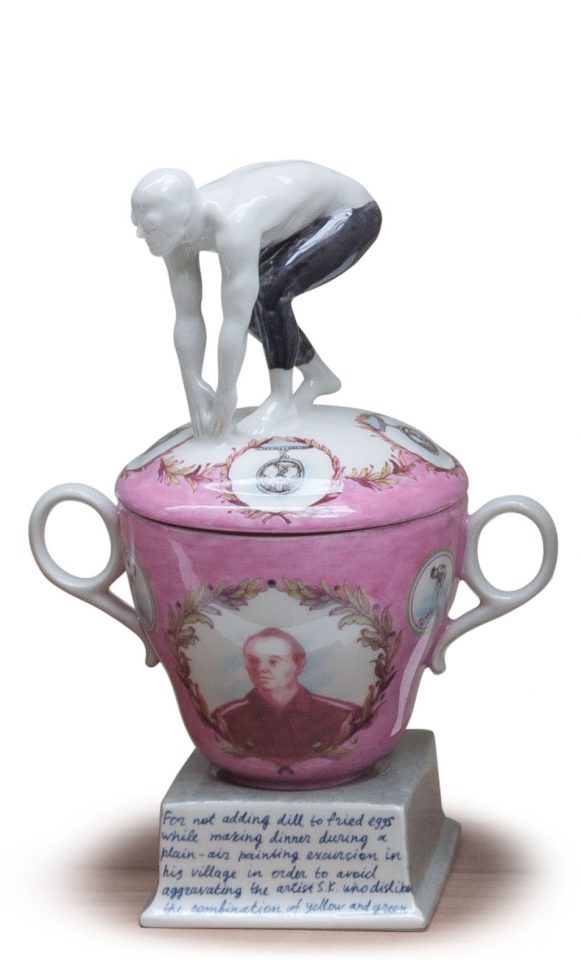 3.1-4bH ~20 cm | For not adding dill to fried eggs while making dinner during a plain-air painting excursion in his village in order to avoid aggravating the artist Mr. S.K. who disliked the combination of yellow and green colors
3.1-4bH ~20 cm | For not adding dill to fried eggs while making dinner during a plain-air painting excursion in his village in order to avoid aggravating the artist Mr. S.K. who disliked the combination of yellow and green colors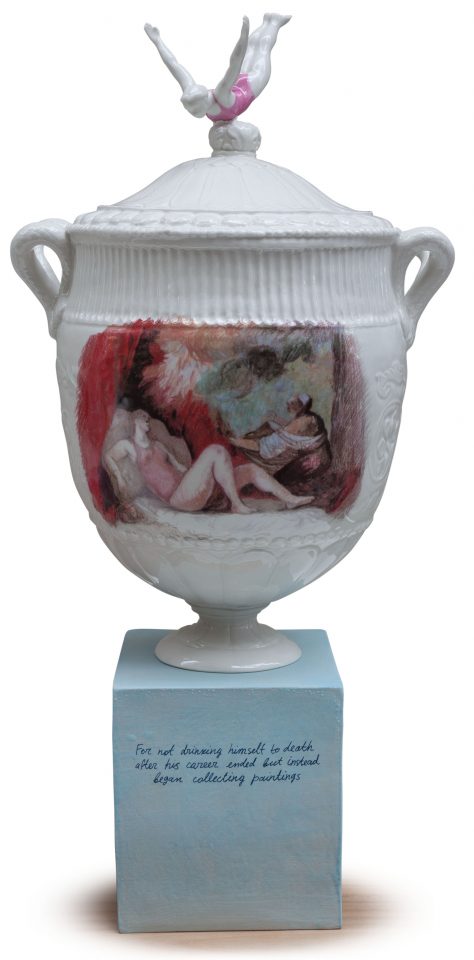 3.1-5bH ~52 cm | For not drinking himself to death after his career ended but instead began collecting paintings
3.1-5bH ~52 cm | For not drinking himself to death after his career ended but instead began collecting paintings-
The Trophy Cups,
or What Could have Happened to My Father.Since my childhood I have already known that one of the biggest misfortunes, which could happen to a person, is to live with the feeling, that you have not realized your talent and just wasted your life. I even remember that chill coming over my heart that this can happen to me as well. I do not know why, but I could hardly imagine anything worse than that.
My father was a swimming coach. He was born in a small village. When he was a child he went regularly to a local river to swim and to exercise, trying to find out his own swimming technique and to improve his results. In other words, he had a vocation to become a coach. I have to smile every time when I try to imagine how my father was coaching himself as a child.
Almost 30 years ago my father was one of the best coaches in the Soviet national swim- ming team. He was very innovative and devoted to his work; he had his own vision of coaching methods. It was extremely important to him to have a success, to get better results, to win. The swimming pool was his second home. After working with him his swim- mers essentially improved their results. That time was a heyday of his career. He was invited to move from provincial Minsk to Leningrad or to Moscow. He was also invited to work as a coach in the USA and Canada; sport magazines were publishing articles about his coaching methods. He told me that at least ten of his swimmers were on their way to Olym- pic medals.
But then some circumstances started to hinder his career. My mother did not want to move to Leningrad or to Moscow. To move abroad was also impossible to my father, because the family could not go with him. Also his straight character and his intransigence to an incom- petence of the sport functionaries had a consequence that he was slowly removed from the leading position. Even to the Olympic games in Canada, where his swimmer won a medal, my father went not as a coach, but as a tourist, watching his victory from stands as an ordi- nary sideliner. For many years his best and most promising swimmers were taken away from him and transferred to other coaches. At a certain moment he became very frustrated and decided to leave the professional sport, feeling totally unrealized and underestimated as a coach. He could prepare many champions, but instead he had to finish his career as an ordinary sport teacher at the University in Minsk.
I always felt that my father had a lot regrets and unrealized ambitions. These days he is devoted to some other than sport matters. He became an art admirer and started to collect paintings. He often goes to the village, where he was born and grown up. He likes to walk there in the places, where he trained himself as a child. And I think he is very happy, because now he sees everything around him with the different eyes, as an artist. I also think, that he always was an artist.
At that time, when he left his job as a coach, he probably thought, that his life was over. But in fact, talent and ambitions can be realized in some other ways and forms than we think, and these ways can make us even happier. As my grandmother would have say about my father’s sport career: "Plague take it!"
So now, in this work, I also try to reflect on, what is at the end a "realization"? Could it take different forms? Maybe the most important thing is not a professional success, but rather that, what is left in shadow, is much more important and valuable?
Supported by the Mondriaan Fonds and The Frozen Fountain.
-